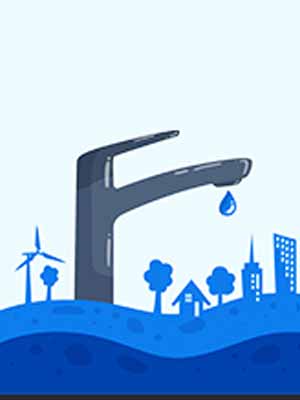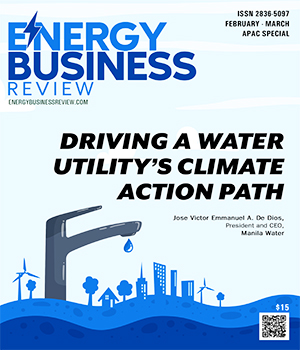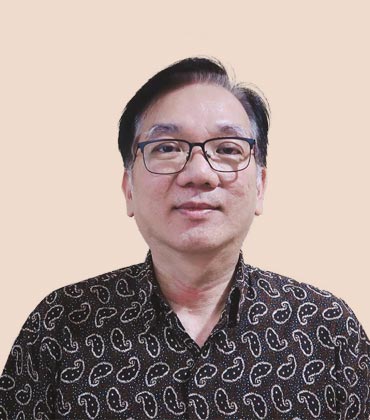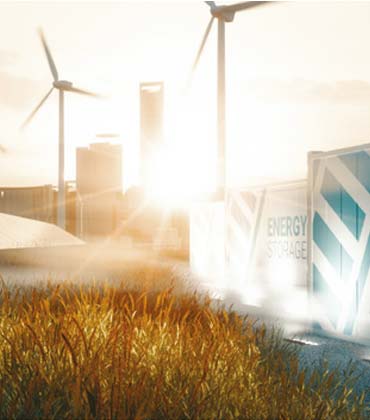Thank you for Subscribing to Energy Business Review Weekly Brief
Southeast Asia, with its diverse landscape, is at the forefront of dealing with the effects of climate change. We encounter a range of climate challenges, including rising temperatures, altered rainfall patterns, intensified tropical storms, and more frequent floods. These weather shifts impact various aspects of life, such as the environment, agriculture, and water management. Responding to the distinctive challenges posed by Southeast Asia’s climate, Manila Water has elevated climate action to a fundamental commitment by issuing a comprehensive Climate Change Policy across the group. This policy, established as early as 2007, has evolved over the years, aligning with emerging trends, scientific research, and regulatory policies. At its core, our climate action emphasizes four key components, adaptation, resource efficiency, transition to renewable energy, and wastewater management. Adaptation With a focus on adaptation, we prioritize water security, asset resilience, and emerg
Featured Vendors Apac
PT. Meindo Elang Indah (Meindo) is Indonesia's leading Engineering, Procurement, Construction, Installation and Commissioning (EPCIC) contractor, delivering comprehensive services covering the entire spectrum of EPCIC projects. Founded in 1987, it stands tall with a legacy of excellence and continued expansion. The firm’s unique in-house detail engineering and fabrication capabilities allow it to offer tailored solutions as per client requirements. At the foundation of their success is strong QHSE (Quality, Health, Safety and Environment) culture, with 80 million recordable manhours without LTI (Loss Time Injury). “From detailed engineering to offshore installation and commissioning, we offer a one-stop solution that streamlines project management and delivers exceptional results,” says Henky Kurniawan, Director of EPCI at Meindo. Over the years, the firm has invested strategically in expanding its capabilities, ensuring that the entire EPCIC process is accurately handled under one roof. Since developing the detailed engineering in 2012, Meindo’s detailed engineering team currently encompasses all major disciplines (process, process safety, civil and structural, mechanical, electrical, instrumentation, piping, pipeline engineering) and has gained recognition and respects of its clients. The company currently operates 2 fabrication yards in Indonesia with a total throughput of 56,000 metric-tons annually, equipped with modern fabrication equipment and location in a free trade zone, it has become an ideal choice for fabricating for international projects. Management’s unwavering commitment for QHSE mixed with the finesse of Indonesian craftsmanship prepares the ideal recipe to take up complex international projects. Since its acquisition, the yard has successfully delivered many complex time bound projects with highest quality, and it continues to be busy taking up new challenges each and every day.
CXO INSIGHTS

Emerging Energy Industry: Perks and Pitfalls
Donell Banks, Senior Advisor, Southern Nuclear

Watercare's Journey Towards Sustainability: Harnessing Solar Energy
Damien Dupont, Renewable Energy Specialist, Watercare Services

The Broader View of Sustainability
Dominic Dowling, Global Head of Sustainability & Risk, EDL

More Collaboration Needed In a Rapidly Growing Solar Industry
Stephen Branscum, Senior Energy Manager, Walmart [NYSE: WMT]
IN FOCUS
Significance of Clean Energy Transition in Transportation
The imperative transition to clean energy within the transportation sector stems from multifaceted environmental,
ETRM Solutions for Volatile Energy Markets
As the energy sector adapts to the transition toward renewables, digital innovation, and heightened regulatory demands, robust ETRM strategies will ensure long-term sustainability and profitability.
EDITORIAL
The Role of Technology and Policy in APAC’s Energy Future
This Energy Business Review APAC edition highlights the growing emphasis on energy security and self-sufficiency. Countries in the region are investing in domestic energy production to reduce dependence on imported energy sources. This includes the development of local renewable energy projects and the exploration of new energy resources. The magazine also contains insights from Jim Helvig, P.E., Vice President of Operations at Dashiell Corporation, and Charles Agnew, Head of Sustainability and Climate Change Adaptation at Sydney Water.
By addressing the challenges and embracing the emerging trends, APAC can achieve a sustainable and secure energy future. The journey ahead will require collaboration, innovation, and a commitment to sustainability, but the potential rewards are immense. We hope these valuable insights from industry leaders featured in this edition will assist you in making informed decisions for your businesses. Let us know your thoughts.









